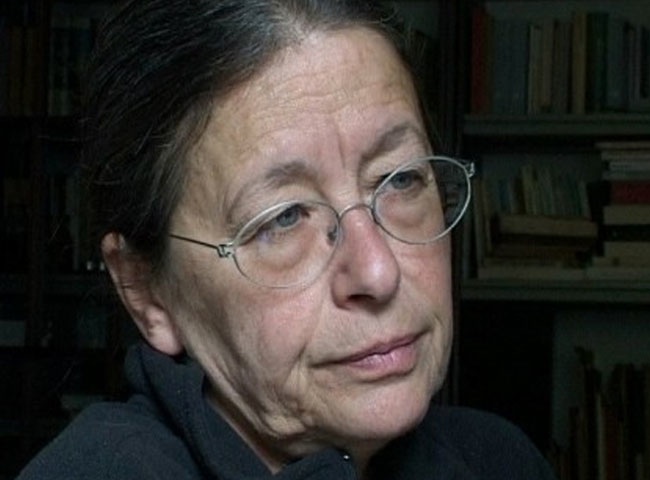Carlo Giuliani, ragazzo
-
Réalisé par Francesca Comencini • Écrit par Luca Bigazzi, Francesca Comencini
-
Italie • 2002 • 63 minutes • 35 mm • Couleur
- Réalisation :
Francesca Comencini - Écriture :
Francesca Comencini, Luca Bigazzi - Image :
Paolo Pietrangeli, Pasquale Scimecat, Daniele Segre, Carola Spadoni, Gianni Angeloni, Luca Bigazzi, Mario Balsamo, Fulvio Wetzl, Gianfranco Fiore, Massimiliano Franceschini, Giuseppe Larrucia, Giuliano Ravera, Michelangelo Ricci, Vicenzo Rizzo, Sergio Sche - Son :
Federico Ricci - Montage :
Linda Taylor
- Production (structure) :
Luna Rossa Cinematografica - Coproduction :
Les Films d'Ici - Diffuseur :
ARTE France - Ayant droit :
Luna Rossa Cinematografica
- N° ISAN :
ISAN 0000-0001-9E81-0000-K-0000-0000-E
Résumé
Le 20 juillet 2001, à Gênes. Journée de mobilisation antimondialisation pour des milliers de manifestants qui s’apprêtent à défiler pacifiquement à l’occasion d’un sommet du G8. Journée banale pour Carlo Giuliani, un jeune homme de vingt-trois ans, étudiant en histoire et militant d’Amnesty International, qui s’interroge. Ira-t-il manifester ? Ira-t-il plutôt à la plage ? Il ira. Il sera abattu par un carabinier et la jeep des policiers lui passera deux fois sur le corps. Qui était Carlo Giuliani ? Que s’est-il passé à Gênes ?
On the one hand, there is the street which was shaken by the extreme violence of police control ; on the other hand, there is the home environment protecting a grieving mother as she relates the day of the demonstration during which her son was killed at point-blank range by a police bullet. On the one hand, there is the war shown live on July 20th 2001 in Genoa ; on the other hand, there is the account of the war, after its crimes have been committed. Whatever the times and places, there is a name for the blend of action and the words of grief that this action engendered, and that name is tragedy. Francesca Comencini's film, "Carlo Giulani, Ragazzo" is a contemporary tragedy. Not only because it shows the terrifying means that the Italian state chose to use to indicate its new style of ruling : an unbridled display of scorn for its citizens, experimentation which methods aimed at intimidating the population as a whole, the use of a police force which in effect took over the country, the impunity of its officers, exceptional measures which where made the norm, the overturning of the legal system, etc. But above all, because what is called cross cutting in the movies here serves a political demonstration which uses pain as its starting point.
Because the urgency of the reporting style is used for the benefit of an authentic, free voice.
Any tragedy is both the account of the irrevocable – what happened cannot be undone – and also, the firm belief that bearing witness to what happened is a way of not sinking completely, that the incident is neither closed on itself, nor over. That is why Francesca Comencini's documentary is not just pure information, despite the thoroughness of the account and the investigation conducted by Carlo Giulani's mother. What comes across is the restrained cry which runs through all tragedy. A mother responds to her son's murder by a surge of political indignation. This indignation takes on a very public form and rises up against the generalised violation of the law, turning her grief into a possible avenue of resistance. As Erri De Luca wrote : Haidi, the mother "does not curse the day, the hour, the murderer. She speaks of her boy murdered in the street and she bequeaths him to us, because in so doing, this boy belongs to us and stays in the streets."
(JPR- FIDMarseille 2002)
Mot(s)-clé(s) thématique(s)
Sélections et distinctions
- 2022 • États généraux du film documentaire • Lussas (France) • Séminaire "Gênes 2001. Une mémoire de l'avenir"
- 2002 • Images en bibliothèques • Paris (France) • Film soutenu par la Commission nationale de sélection des médiathèques
Comment avoir accès au film ?
-
Édition DVD
- Il n'existe pas d'édition DVD à notre connaissance
-
Accès VOD
- Il n'existe pas d'accès en VOD à notre connaissance
- Diffusion non commerciale / Consultation

